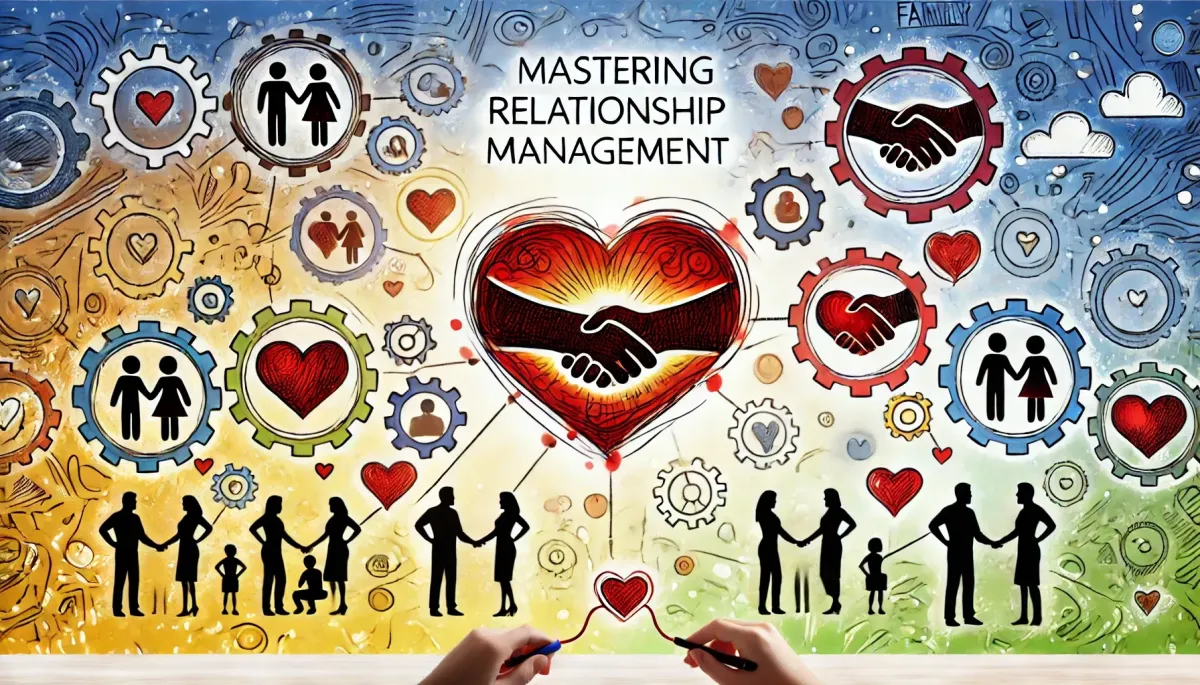Connected Souls
Empowering Your Journey to a Thriving Life
Welcome to Connected Souls!
At Connected Souls, we believe in the power of the human mind, personal growth, and spiritual well-being. Our mission is to empower you to thrive in every aspect of your life. Whether you're seeking advice on relationship management, exploring your spirituality, or looking for ways to develop personally, we're here to guide you on your journey.
Latest Articles

Mastering Relationship Management
Most relationships require ongoing effort to nurture and strengthen. In this article, you will discover practical advice and strategies to improve your relationships, enhance communication, and foster deeper connections with your loved ones. By mastering the art of relationship management, you can create more fulfilling and harmonious interactions in your personal and professional life. Learn how to communicate effectively, resolve conflicts, and show appreciation to those who matter most to you. Take the first step towards building strong and lasting relationships today.
Building Strong Foundations
To effectively manage your relationships, you must start by setting clear goals. Reflect on what you want to achieve in your relationships - whether it's building trust, improving communication, or simply fostering deeper connections with your loved ones. These goals will serve as a roadmap to guide your efforts and actions in nurturing those relationships.
Identifying Your Relationship Goals
Goals are important in any aspect of life, including relationships. By clearly identifying your relationship goals, you can actively work towards them and measure your progress along the way. Take some time to sit down and think about what you want to prioritize in your relationships, and then break those goals down into actionable steps that you can take to achieve them.
Developing Emotional Intelligence
Identifying and managing your own emotions is crucial for building strong connections with others. Emotional intelligence involves being aware of your emotions, understanding how they impact your thoughts and behavior, and effectively expressing them in a healthy way. This not only helps you navigate conflicts and challenges in relationships but also allows you to empathize with others and build a deeper understanding of their feelings and perspectives.
Effective Communication Strategies
Active Listening Skills
Skills are a fundamental aspect of effective communication in any relationship. To truly connect with your loved ones, mastering the art of active listening is important. This involves not only hearing what the other person is saying but also understanding their emotions, body language, and underlying message. By demonstrating empathy and genuine interest in the conversation, you can strengthen your bond and create a deeper connection with your partner.
Expressing Yourself Clearly and Assertively
Communication is a two-way street in any relationship. Along with being a good listener, it is equally important to express your thoughts and feelings clearly and assertively. This involves being honest about your needs and boundaries while also respecting those of your partner. By effectively communicating your emotions and concerns, you can avoid misunderstandings and create a more harmonious relationship.
With open and honest communication, you can build trust and mutual respect in your relationships. It is important to express yourself in a calm and respectful manner, even during difficult conversations. By using "I" statements and avoiding blame or criticism, you can encourage a healthy dialogue and find common ground with your loved ones.
Conflict Resolution Techniques
For thriving relationships, knowing how to navigate conflicts is crucial. Techniques such as active listening, compromising, and finding solutions together can help resolve disagreements in a constructive way. Rather than avoiding conflict, approach it as an opportunity to strengthen your bond and understanding with your partner. By working together to find a resolution, you can cultivate a more resilient and harmonious relationship.
Strive to approach conflicts with a problem-solving mindset, focusing on finding solutions rather than dwelling on the issue at hand. By practicing patience, empathy, and effective communication, you can navigate disagreements and conflicts with grace and understanding, ultimately deepening your connection with your loved ones.
Navigating Different Relationship Dynamics
Romantic Relationships: Building Intimacy and Trust
Building intimacy and trust in your romantic relationships is crucial for creating a strong and lasting bond. One key aspect of building intimacy is open and honest communication. Make sure to express your feelings, thoughts, and desires openly with your partner. This will help foster a sense of closeness and understanding between the two of you. Trust is also crucial in any relationship, so make sure to be reliable and consistent in your actions to build trust with your partner.
Family Relationships: Managing Expectations and Boundaries
Intimacy within family relationships can be complex as each member may have different expectations and boundaries. It's important to communicate openly with your family members about your needs and boundaries. Setting clear expectations and boundaries can help prevent misunderstandings and conflicts within the family. Remember to respect the boundaries of your family members as well, as this will foster mutual respect and understanding.
The key to managing expectations and boundaries in family relationships is to approach conversations with empathy and understanding. Try to see things from the perspective of your family members and be patient when discussing sensitive topics. By establishing healthy communication and boundaries, you can strengthen your family relationships and create a supportive and loving environment.
Friendships: Cultivating Meaningful Connections
Dynamics in friendships revolve around mutual respect, trust, and shared experiences. Cultivating meaningful connections with your friends involves being a good listener, offering support, and participating in activities together. It's important to show up for your friends, listen to their concerns, and be there for them when they need you. Additionally, making an effort to spend quality time together and create lasting memories can deepen your friendships.
Cultivating meaningful connections in friendships requires effort and investment from both parties. Make sure to prioritize your friendships and show appreciation for your friends' presence in your life. By nurturing these connections, you can create a supportive network of friends who will stand by you through life's ups and downs.
Emotional Intelligence in Relationships
Recognizing and Managing Your Emotions
Despite the importance of emotional intelligence in relationships, many of us struggle with recognizing and managing our own emotions. Managing your emotions effectively means being aware of what you are feeling, understanding why you feel that way, and choosing how to express or respond to those emotions in a healthy and constructive manner.
Empathy and Perspective-Taking in Relationships
On the other hand, empathy and perspective-taking play crucial roles in fostering deep connections with loved ones. Being able to put yourself in someone else's shoes and truly understand their feelings and perspective can lead to more compassionate and supportive interactions.
For instance, when your partner is upset about something, instead of immediately jumping to defend yourself or dismiss their feelings, try to pause and empathize with their emotions. By actively listening and showing empathy, you can strengthen your bond and communication in the relationship.
Overcoming Common Relationship Challenges
Dealing with Criticism and Feedback
Keep in mind that criticism and feedback are often a reflection of the person giving it, rather than a true representation of your worth. When faced with criticism, try to separate the message from the emotion behind it. Take a moment to pause, breathe, and reflect on the feedback before responding. Do not forget, constructive criticism can be an opportunity for personal growth and improvement in your relationships.
Managing Jealousy and Insecurity
Dealing with feelings of jealousy and insecurity can be challenging but it's important to address these emotions head-on. Avoid comparing yourself to others and focus on building self-confidence and self-worth. Communication is key - talk openly with your partner about your insecurities and work together to build trust and understanding in your relationship.
Managing jealousy and insecurity requires self-awareness and a willingness to explore the root causes of these feelings. By acknowledging your emotions and discussing them openly with your loved one, you can take proactive steps towards creating a more secure and trusting relationship.
Rebuilding Trust After a Betrayal
Betrayal can be devastating in a relationship, but rebuilding trust is possible with time, effort, and honest communication. It's important to acknowledge the hurt and betrayal you've experienced, but also to discuss with your partner the steps needed to move forward. Patience and understanding are important as you work towards healing and regaining trust in each other.
The journey of rebuilding trust after a betrayal may be challenging, but with commitment and a shared willingness to repair the relationship, you can emerge stronger and more connected than before.
Maintaining Healthy Relationships
All healthy relationships require effort and intention to maintain. Prioritizing quality time and shared activities is imperative in fostering deeper connections with your loved ones. By setting aside dedicated time to spend together, whether it's going for a walk, cooking a meal, or watching a movie, you are actively investing in the relationship and showing your loved ones that they are important to you.
Prioritizing Quality Time and Shared Activities
Healthy relationships are built on a foundation of shared experiences and quality time spent together. These moments create lasting memories and strengthen the bond between you and your loved ones. Make it a priority to engage in activities that you both enjoy and make an effort to create special moments that you can cherish together.
Practicing Forgiveness and Letting Go
One of the key aspects of maintaining healthy relationships is practicing forgiveness and letting go. Holding onto grudges or resentments can create barriers in communication and hinder the growth of the relationship. By letting go of past grievances and practicing forgiveness, you can create space for healing and understanding in your relationships.
Nurturing Independence and Interdependence
Relationships thrive when there is a balance between independence and interdependence. It's important to nurture individuality within the relationship while also fostering a sense of togetherness and support. Encourage each other's personal growth and celebrate the unique qualities that make you both who you are.
Summing up
Drawing together all the valuable advice and strategies presented in this article, it is clear that there are practical steps you can take to improve your relationships, enhance communication, and foster deeper connections with loved ones. By prioritizing active listening, showing empathy and understanding, and being open and honest in your conversations, you can build stronger and more fulfilling relationships that will stand the test of time.
Remember that relationships require effort and attention, but the rewards of deeper connections and emotional intimacy are well worth it. By implementing the advice and strategies shared in this article, you can become a master of relationship management and experience the joy and fulfillment of truly meaningful connections with those you care about.
What Our Customers Say
"Connected Souls has truly changed my life. The articles are insightful, and the advice is practical and easy to implement."
- Sarah L.
"I found a sense of peace and purpose through the spiritual guidance offered here. Highly recommend!"
- Mark D.
© 2024 Connected Souls. All Rights Reserved.
